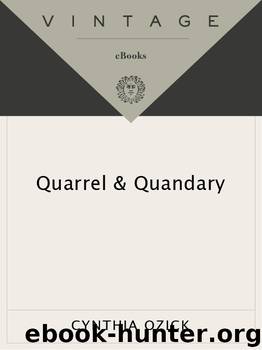Quarrel & Quandary by Cynthia Ozick

Author:Cynthia Ozick [Ozick, Cynthia]
Language: eng
Format: epub
ISBN: 978-0-307-80788-5
Publisher: Knopf Doubleday Publishing Group
Published: 2011-10-11T16:00:00+00:00
Public Intellectuals
The term “public intellectual” has been in fashion for some time now, but its embodiment has always been with us. Socrates was what we would call a public intellectual; and Isaiah; and Maimonides; and Voltaire; and Emerson. But observe: presumably not Aristotle, not Montaigne, not George Eliot, not Santayana. George Eliot presided over a salon, of which she was the undisputed center and engine; and still we would not cite her as a public intellectual. Hannah Arendt and Mary McCarthy were certainly public intellectuals; Lionel Trilling was not.
If there are public intellectuals, it must follow that there are also private intellectuals. What is the difference between them? It cannot be a difference of substance or subject matter. William James, despite countless public lectures, was not really a public intellectual; Emerson, who confronted many of the same themes, was. Nor could it have been simply reticence of temperament that separated Lionel Trilling from, say, Irving Howe, an almost prototypical public intellectual. And if we could clearly define the difference, is it important, would it matter?
There recently came into my hands a thin little chapbook, bound in the pallor of an aging blue and entitled “The New Disorder,” containing remarks set down in 1941 by E. M. Forster. Now you may instantly object: why bring up Forster, a novelist, an artist, in the context of the public intellectual? The reason is this. Before we had the dispassionate phrase “public intellectual,” there was a simpler name in common use that appeared to cover everyone who attends to, and rallies around, and pokes at and palpates ideas. That name was “thinker.” No one can deny that Forster, though distinguished for fiction, was also a thinker. He surely addressed literary issues, but now and then he touched on political issues, the hallmark of the public intellectual. A Passage to India is inevitably read as a protest against British colonialism in India; that it is a masterwork able to escape the fate of a tract is a measure of Forster’s both delicate and robust art. And the indelible epigraph of Howards End, “Only connect,” is a slogan as political in its intention as it is private.
Beyond the novels there are the essays—pre-eminently “On Liberty in England,” a talk delivered at an international writers’ conference in Paris in 1935. Here Forster defends freedom of expression and attacks censorship, particularly of homosexual writing. And here also he situates himself as any number of writers and intellectuals situated themselves in the nineteen-thirties: “As for my politics,” he tells his audience, “you will have guessed that I am not a Fascist—Fascism does evil that evil may come. And you may have guessed that I am not a Communist, though perhaps I might be one if I was a younger and braver man, for in Communism I can see hope. It does many things which I think evil, but I know that it intends good.” Lately, it goes without saying, these latter words are achingly hollow; and there were some for whom they were terribly hollow even two-thirds of a century ago.
Download
This site does not store any files on its server. We only index and link to content provided by other sites. Please contact the content providers to delete copyright contents if any and email us, we'll remove relevant links or contents immediately.
| Books & Reading | Comparative Literature |
| Criticism & Theory | Genres & Styles |
| Movements & Periods | Reference |
| Regional & Cultural | Women Authors |
4 3 2 1: A Novel by Paul Auster(12363)
The handmaid's tale by Margaret Atwood(7749)
Giovanni's Room by James Baldwin(7315)
Asking the Right Questions: A Guide to Critical Thinking by M. Neil Browne & Stuart M. Keeley(5751)
Big Magic: Creative Living Beyond Fear by Elizabeth Gilbert(5744)
Ego Is the Enemy by Ryan Holiday(5409)
The Body: A Guide for Occupants by Bill Bryson(5072)
On Writing A Memoir of the Craft by Stephen King(4924)
Ken Follett - World without end by Ken Follett(4717)
Adulting by Kelly Williams Brown(4561)
Bluets by Maggie Nelson(4542)
Eat That Frog! by Brian Tracy(4512)
Guilty Pleasures by Laurell K Hamilton(4437)
The Poetry of Pablo Neruda by Pablo Neruda(4088)
Alive: The Story of the Andes Survivors by Piers Paul Read(4017)
White Noise - A Novel by Don DeLillo(3999)
Fingerprints of the Gods by Graham Hancock(3983)
The Book of Joy by Dalai Lama(3966)
The Bookshop by Penelope Fitzgerald(3841)
